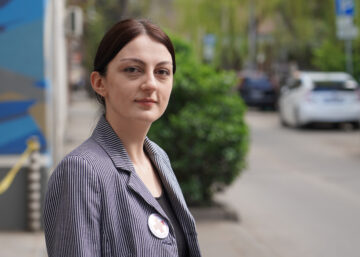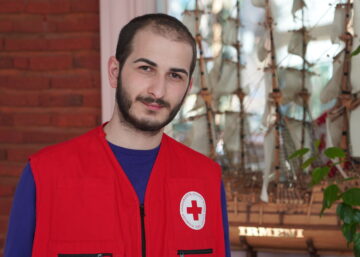“As colleagues, we are supporting each other best possible, as professionals the client has top priority, but as humans we need to keep ourselves healthy and ensure our emotional wellbeing.”.
After arriving at the office, the first calls come in right when I put on my headset. Men who lost their job, teenagers struggling with anxiety and depression, women who mourn for their loved ones. I am attentively listening to all the tales of fate COVID-19 caused, empathizing with those who suffer because of the pandemic that has been preoccupying us for two years now.
My name is Arevik and I am one of the voices you hear when you call the psychosocial support hotline of the Armenian Red Cross Society. Before the outbreak of the Coronavirus, I provided psychological support for refugees. In long term therapies I help displaced people who lost everything when they had to flee their country.
After the break-out of COVID19 in Armenia I responded to the impact immediately but also had to take care of my existing clients, the refugees. Right now, the pandemic hits the most vulnerable people even harder. In a survey, 40% of respondents state that they feel concerned thinking about the pandemic, more than 10% even feel depressed and anxious.
That’s why our job at the hotline is so important, but that is also what makes it tough. Even the state refers to our helpline when people call for support and don’t know who to turn to. We set up the psychosocial support hotline from scratch. No time to prepare, no time to waste.
There’s a dense workload for me and the team. We don’t have time for us, we don’t have time to stop, we don’t have one minute to get away from the phone. We need to be there every single minute until our shift is finished. That’s why we stock our desks with sandwiches, tons of water bottles and a big pot of coffee right at the beginning of our workday.
We don’t have time for selfcare. After our shift at the phone, we sit down to plan the next steps. Additional to the pressure induced by the workload, negative emotions during most calls can drag you down. It’s hard not to get overwhelmed by the intense stories we hear throughout the course of a day.
As colleagues, we are supporting each other best possible, as professionals the client has top priority, but as humans we need to keep ourselves healthy and ensure our emotional wellbeing. We need an enjoyable dinner with our families or just a good night’s sleep to recharge our batteries.
The first months were the hardest, mainly because the situation was unclear, and we had to fit the additional workload into our already tight schedule. Fortunately, the support by our leadership and the transparent information we received gave us assurance.
We had to adapt to new situations on a daily basis and with time, we learned to quickly react to the unpredictable. Sometimes we were being informed about our tasks on the very same day. Being confronted with a broad spectrum of psychological needs, we took the opportunity for self-development and acquired new skills to help beneficiaries.
If there is one thing, I take away from this, it’s that we as health workers need to protect our mental health. If you don’t look after yourself, how will you look after others?


